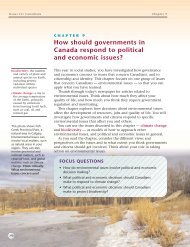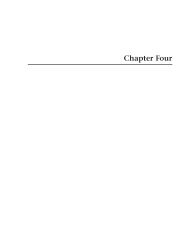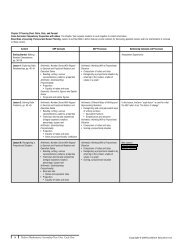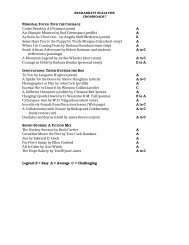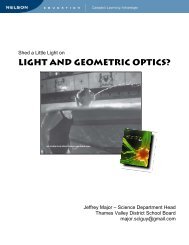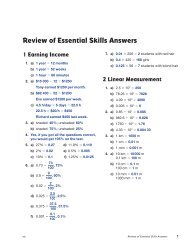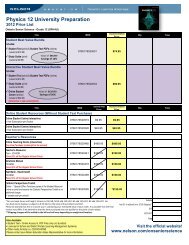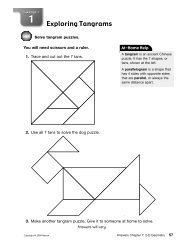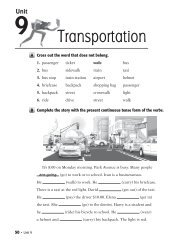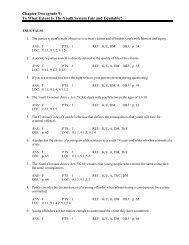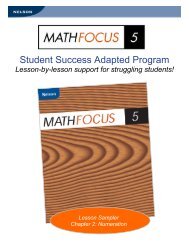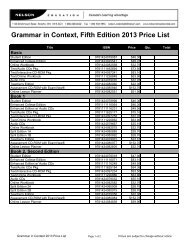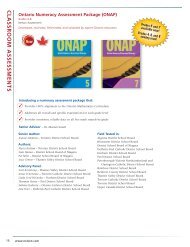PRE-PUBLICA TION EDITION - Nelson Education
PRE-PUBLICA TION EDITION - Nelson Education
PRE-PUBLICA TION EDITION - Nelson Education
You also want an ePaper? Increase the reach of your titles
YUMPU automatically turns print PDFs into web optimized ePapers that Google loves.
3.B.3. Predicting and HypothesizingA prediction states what is likely to happen as theresult of a controlled experiment. Scientists basepredictions on their observations and knowledge.They look for patterns in the data they gather tohelp them understand what might happen nextor in a similar situation (Figure 6). A predictionmay be written as an “if … then …” statement. Forthis investigation, your prediction might be, “If theamount of dissolved salt is increased, then theboiling point will also increase.”Figure 6 A positively charged piece of plastic causes a streamof tap water to bend. What would you predict might happen if anegatively charged object is brought near the stream of water?In summary, a prediction states what you thinkwill happen. Remember, however, that predictionsare not guesses. They are suggestions based on priorknowledge and logical reasoning.A prediction can be used to generate a hypothesis.A hypothesis is a tentative answer about the outcomeof a controlled experiment along with an explanationfor the outcome. A hypothesis may be written inthe form of an “if … then … because …” statement.If the cause variable is changed in a particular way,then the effect variable will change in a particular way,and this change occurs because of certain reasons.For example, “If the amount of salt is increased, thenthe boiling point will also increase because salt formsattractions with water molecules and prevents themfrom changing into gas.” If your observations confirmyour prediction, then they support your hypothesis.You can create more than one hypothesis from thesame question or prediction. Another student mighttest the hypothesis, “If the amount of salt is increased,then the boiling point will not change because theattractions that salt forms with water are very weak.”Of course, both of you cannot be correct. Whenyou conduct an investigation, your observations donot always confirm your prediction. Sometimes,they show that your hypothesis is incorrect. Aninvestigation that does not support your hypothesisis not a bad investigation or a waste of time. Ithas contributed to your scientific knowledge. Youcan re-evaluate your hypothesis and design a newinvestigation.3.B.4. PlanningYou have been asked to design and carry out theboiling point investigation described in 3.B.3. First,you create an experimental design. To conduct acontrolled experiment that tests your hypothesis, youdecide to change only one variable—the amount ofdissolved salt. This is your independent variable. Youdissolve 5.0 g, 10.0 g, 15.0 g, and 20.0 g samples ofsalt in identical beakers containing exactly 100 mLof water. You also prepare a beaker containing waterwith no salt. Each solution is then heated using thesame hot plate until it boils. A thermometer that issuspended in each solution measures the temperatureat which boiling occurs—the dependent variable.Now consider the equipment and materials youneed. Be sure to include any safety equipment, suchas an apron or eye protection, in your equipment andmaterials list. How will you secure the beaker so thatit doesn’t accidentally fall off the hot plate as it boils?Will you use tap water or distilled water?612 Skills Handbook NEL



